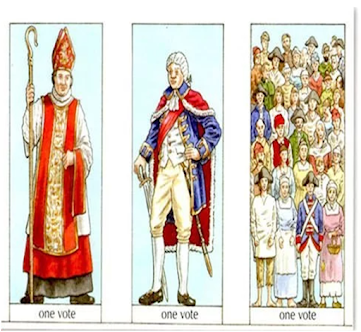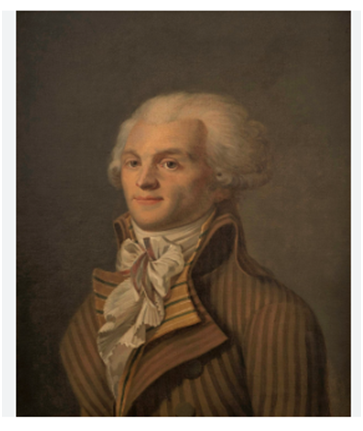BA HISTORY / SEMESTER VI / HISTORY OF EUROPE 1789 TO 1945
UNIT I
French Revolution
(1789-1799)
The French Revolution was the watershed event in modern European history that brought about the enlightenment principles and democracy, creating a rational and egalitarian society. It started in 1789 and ended in 1799. The French Revolution was a time of social and political upheaval in France and its colonies. The liberal and radical ideas overthrew the Monarchy and influenced the decline of absolute Monarchies in other parts of Europe. This revolution led to the rise of Napoleon Bonaparte as well.
France in 1789:
France was the most populated nation in Europe during this time and had been growing in wealth and prestige since the time of King Louis XIV. But this economic growth wasn’t visible as the country was still very backward socially and politically.The social divide was because it was still divided into feudal classes of people clergy, those who pray, nobles, those who fight, and the peasants, the working class. And political backwardness was because they were still ruled by an absolute monarch who believed in the divine right of kings.But the French involvement in the American Revolution of 1776 was a costly affair and the extravagant lifestyle of King Louis XVI and the royal family was draining the coffers. The empty royal coffers, poor harvests, and rise in food prices had created feelings of unrest among the poor rural and urban populace. The matter was further worsened by the imposition of taxes that provided no relief. As a result rioting, looting and general strikes became the norm.
The major causes that
led to the French Revolution:
1.
Social
inequality was very prevalent in French society of 18th
·
The
clergy and the nobility formed the first two Estates and were the most privileged
classes. They were exempted from payment of taxes to the State.
·
The
Third Estate consisting of peasants and workers formed the majority of the
population. They were burdened with excessive taxes with no political and
social rights. As a result, they were extremely discontent.
2.
The
economic drain was falling heavy n the shoulders of the working class
increasing the hostility:
·
Louis
XVI waged many wars making the State coffers were empty.
·
The
situation was made even more complex by France’s involvement in the American
War of Independence and the faulty system of taxation.
·
The
extravagant lifestyle of the royals added to the financial burden.
3.
The
unstable political situation: The situation was very unstable
because the Bourbon king of France, Louis
XVI was an extremely autocratic and weak-willed king who led a life of
excessive luxury. This caused anger among the masses that were leading lives of
extreme poverty and widespread hunger.
4.
The 18th
century brought a conscious change in the French thinkers who refused the
‘Divine Rights Theory’:
·
Philosophers
like Rousseau rejected the paradigm of absolute monarchy and promulgated the
doctrine of equality of man and sovereignty of people.
·
They
played a pivotal role in exposing the fault lines of the old political system-
‘the ancient regime’, thus adding to the popular discontent.
·
The
American Revolution also triggered the ideas of enlightenment and liberty among
the intellectuals of the French society.

Jean Jacques Rousseau
Maximilian Robespierre
Course of the French
Revolution:
1789: The meeting of the Estate Generals
·
·
The
Estates-General was an assembly that represented the French nobility clergy and
the middle class. They were called by Louis XVI to discuss the new tax measures
in May 1789.
·
The
third estate was already gathering support for their involvement in the
decision-making body and voting rights during this time.
·
The
middle class was in favour of the political and judicial reforms while the
nobles did not want to give up their privileges. The talks with the third
estate also failed.
·
The
Tennis court oath: The third estate and their support formed the National
Assembly and took an oath of office in June 1789 and vowed not to disperse
until reforms have been initiated.
·
Seeing
no other option Louis XVI had to absorb the three assemblies into the new
order.
1789-92: The revolution
·
The
national assembly continued in Versailles as the nation was gripped in fear and
uncertainty which led to the insurgency.
·
This
resulted in the taking of Bastille fortress on July 14, 1789. This event marked
the beginning of the French Revolution.
·
The
peasants revolted, attacked the houses of nobles and tax collectors, and the
upper class was forced to flee for their lives. This period is called the
period of Great Fear.
1789: The Declaration of Rights of the Man
·
The
National Assembly adopted the Rights of Man and of the Citizen on August 4,
1789. The charter was based on democratic principles, drawing from
philosophical as well as political ideas of Enlightenment thinkers like
Jena-Jacques Rousseau.
·
The
French constitution was adopted on September 3, 1791. It was moderate in its
stance by limiting the powers of the king, but it was not enough for the more
radical members of the assembly, Robespierre who wanted Louis XVI to stand
trial.
1793-95: The Reign of Terror
·
A
group of insurgents attacked the royal residence in Paris and
arrested Louis XVI on August 10, 1792
·
The
following month many who were accused of being the ‘enemies of the revolution’
were massacred in Paris. The Legislative Assembly was replaced by the National
Convention which proclaimed the establishment of the Republic of France and the
abolition of the Monarchy.
·
King
Louis XVI was condemned to death on January 21, 1793, and executed for treason.
His wife, Marie Antoinette was also executed nine months later.
·
The
execution of the king marked the beginning of the most violent and turbulent
phase of the French Revolution – the Reign of Terror.
·
The
National Convention was under the control of an extremist faction led by
Robespierre. Under him, thousands were executed for suspected treason and
counter-revolutionary activities.
·
The
Reign of Terror ended after Robespierre execution on July 28, 1794.
1795: The end of the French Revolution
·
On
August 22, 1795, the National Convention composed of moderates approved the
creation of a new constitution that created France’s bicameral legislature.
·
A
Directory, a five-member group was formed by the parliament, and an army was
groomed under General Napoleon Bonaparte.
·
The
Directory became corrupt and the army had more powers with them. A coup d’état
was staged by Napoleon himself, toppling them from power.
·
Napoleon
appointed himself “first consul”. The French Revolution was over and the
Napoleonic era was about the begin.
Role of women in the
French Revolution:

· Women in the Third Estate worked for a living and didn’t have access to education or training. Only daughters of the noblewomen and richer sections of society had access to any education. The wages for women were lower than those of men. Women were also mostly homemakers, hence they had to do all the housework, care for children.
· But during the Revolution, women played an active role in revolutionary activities. They started their own clubs and newspapers. One of the most famous political clubs was the Society of Revolutionary and Republican Women and they were disappointed by the Constitution of 1791 which designated them, passive citizens. This Society demanded equal political rights as men. They wanted to vote and stand in elections for political office.
· After the end of the revolution, the early revolutionary governments introduced many laws that improved the lives and status of women in society. Schools were created, and education was made compulsory for all girls. Marriage without consent was made illegal and divorce was made legal. Women were also allowed to be artisans and run small businesses.
Impact of the French
Revolution:
The French revolution brought fundamental social, political, and economic changes in the history of France.
·
End of
the social divide: The French Revolution destroyed the
social discriminative class system in France and declared equality for all.
This led to the rise of the middle class who had acquired education to
positions of responsibility.
·
Declaration
of rights of man: The constitutional assembly came out with the
document of human rights which granted political liberty, like freedom of
speech, press, association, worship, and ownership of property.
·
Revolutionary
ideas: The
revolution gave birth to the revolutionary ideas of liberty, equality, and
fraternity. These ideas started in France and spread to other areas like Italy,
Germany, etc. promoting equality, freedom and democracy, and good governance.
France became the birthplace of democracy.
·
End of
Monarchy: The
Bourbon monarch that had ruled France for over 400 years came to end by the
French revolution. The monarchy rule was abolished in 1792 and replaced it with
the Republican form of Government. Although the Bourbon monarch was restored by
the great powers after the downfall of Napoleon, it could not survive
beyond 1830 because the monarchs were already weakened by the changes caused by
the French revolution.
·
Political
Parties: France
became a multiparty state as a result of the revolution. The freedom of
association led to the rise of political clubs such as the Jacobins,
Cordeliers, etc that competed for power. These parties kept the government
under check and balance by criticizing bad policies.
·
Parliamentary
Democracy: The
French revolution led to the revival of the parliament which was abandoned for
a period of over 175 years. The revolution gave France a functional parliament
with representatives who are democratically elected.
·
Constitution
and Rule of Law: The
French revolution introduced the rule of law. Before 1789, France had no
constitution to safeguard people’s rights and freedom. The constitution clearly
separated the executive, the judiciary, and the legislature.
·
Land
ownership: The
revolution brought new reforms and changes to land ownership in France. Before
the revolution, the land was dominated by the clergy and the nobles who
exploited the peasants. The working class was given equal rights to possess the
land.
·
National
Guard: There
was the formation of the National Guard that replaced the royal guard of the
Bourbon monarchy. National Guard was the revolutionary army whose role was to
protect the achievements of the French revolution.
The revolution achieved the good through a path of negatives nevertheless. There were losses of lives and properties, the reign of terror saw violence, the economy further declined to make the poor even poorer. The relationship between the church and the state deteriorated as the radical new laws and nationalization of church properties became a sour page.
The revolution also led to poor relationships between France and other states. Revolutionary ideas of the French revolution were threats to other powers and monarchs in Europe, hence, Britain, Russia, Prussia, Austria, and other countries allied against France in order to prevent the spread of revolutionary ideas to their countries.
Global impact of the
French Revolution:
·
The French Revolution changed modern
history forever and many nations took inspiration from the ideologies it gave
birth to.
·
The suppressive monarchies were being
challenged everywhere by the people.
·
The ideas of liberty and equality spread
all around the world over the years through the French armies.
·
The French became the dominant force to
be reckoned with as it radicalized the political and social system of the
18th century.
·
The French Revolution ended feudalism
and made a path for future advances in individual freedoms, democratic
principles, and equality of life.











Comments
Post a Comment